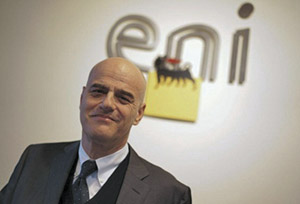
Italian energy group Eni says Zohr field may hold as much as 30 trillion cubic feet of gas, making it the largest known gas discovery in the Mediterranean Sea • Energy Minister Yuval Steinitz: We have to approve the gas framework without delay.
By Hezi Sternlicht, Zeev Klein, News Agencies and Israel Hayom Staff
Italian energy group Eni SpA announced Sunday it had discovered a “supergiant” natural gas field, potentially the largest known gas field in the Mediterranean Sea, off the Egyptian coast, predicting the find could help meet Egypt’s gas needs for decades to come.
Eni struck natural gas 190 kilometers (120 miles) from the Egyptian coast, at a depth of 1,450 meters (4,760 feet) in the Shorouk Block, the company said. The block is about 107 kilometers (66 miles) from Port Said. Named Zohr, the field could hold as much as 30 trillion cubic feet of gas.
“Zohr is the largest gas discovery ever made in Egypt and in the Mediterranean Sea and could become one of the world’s largest natural gas finds,” the company said in a statement, adding that it had full concession rights to the area.
Israeli experts said the Egyptian gas field may eventually prove bigger than the Leviathan and Tamar fields combined.
Leviathan, discovered in 2010, roughly 130 kilometers (81 miles) west of Haifa, holds an estimated 22 trillion cubic feet of natural gas. Tamar, discovered some 80 kilometers (50 miles) west of Haifa in 2009, is believed to have reserves of up to 8.4 trillion cubic feet.
For Israel, the discovery means dramatic competition in the natural gas industry.
“The discovery of the huge natural gas field off Egypt’s shores is a painful reminder that while Israel ‘fell asleep at the wheel’ and has taken far too long to approve the natural gas framework, the world is moving forward in a way that can affect our exports,” National Infrastructure, Energy and Water Resources Minister Yuval Steinitz said Sunday.
“We have to approve the gas framework without delay and advance Israel’s natural gas industry,” he said.
Industry analysts hedged Sunday that while Leviathan’s financial worth may slightly decline over the Egyptian discovery, Delek Group and Texas-based Noble Energy, its developers, have nothing to fear. “Developing the Egyptian field will take at least five or six years. If anything, it will be an incentive for them to expedite Leviathan’s development,” one expert said.
Zohr represents other significant gas discoveries in the Mediterranean in recent years, and is expected to have a major impact on the region’s economy and potentially offer Europe new supply options, allowing it to lessen its dependence on Russian gas imports.
It also represents a major boost for Egypt, where power cuts caused by gas and oil shortages have often fueled unrest.
Eni said it planned to fast-track development of the site, using existing infrastructure.
The Italian government owns 30 percent of Eni, which is the biggest foreign oil and gas producer in Africa, where it has significant operations in Libya. The company has operated in Egypt for over 60 years and is one of the main energy producers in the country, with a daily output of 200,000 barrels of oil equivalent.
Egypt signed a $2 billion exploration deal with the Italian company in June, allowing Eni to explore in Sinai, the Gulf of Suez, the Mediterranean and areas in the Nile Delta.
“This historic discovery will be able to transform Egypt’s energy scenario,” Eni CEO Claudio Descalzi, who met Egyptian President Abdel-Fattah el-Sissi on Saturday to discuss the find, said.
Egypt, which once exported gas to Israel and elsewhere, has become a net energy importer over the last few years.
Under el-Sissi, Egypt’s state-owned gas company EGAS has increasingly rationed gas supplies to much of the domestic industry, which has at times crippled production and hampered the economic recovery.
The government has also attempted to improve the energy situation by slashing state energy subsidies, paying down its debt to foreign energy firms, and negotiating import agreements.










